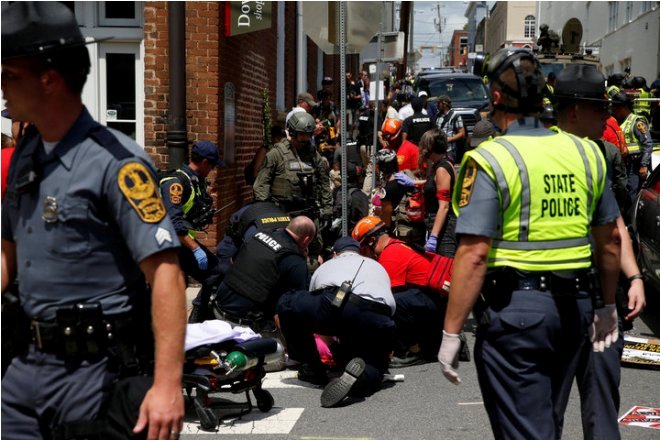
Friday August 18, 2017
I’ve seen horrible violence while serving abroad, but for the first time I felt what it’s like to be the target.
I have dedicated my life to helping people in far-flung places. I live with the images of blood-splattered huts where people were tortured, of wild-eyed, drugged-up youth manning vehicle checkpoints through which I must pass, of starving and mutilated children.
As a U.N. aid worker in Africa, I served in some of the most dangerous places in the world: civil war in Liberia, tribal conflict and famine in Somalia, deadly xenophobic violence in South Africa. But it wasn’t until the so-called “alt-right” converged on idyllic Charlottesville, Virginia, that violence and hatred were directed at me for the first time.
I had not planned on joining the protests that Saturday afternoon. Like many of us, I struggled with a basic question: Was it was better to take a stand against hate, or starve such evil of an audience?
As I know too well from my 20 years in Africa, this is how civil wars start.
That morning I occupied myself with the quotidian tasks of editing a report and buying groceries. Ultimately, I decided to join a small gathering of artists and performers organized by Black Lives Matter in downtown Charlottesville, away from the face-off between white supremacists and counter-protestors.
But I never made it. Just a few blocks from the well-appointed home where I was summer house-sitting for a local meditation teacher, I joined a group of counter-protestors. We decided to avoid confronting the neo–Nazi groups assembled in a nearby park, and head to the downtown Pedestrian Mall.
Not far away, 20-year-old James Alex Fields Jr., sat in his car. I did not hear his engine rev. I did not see his car barreling down the alleyway toward us. I only felt the impact, felt myself spinning, thrown back, bouncing off of other people. I rose and could hardly believe what I saw: young men lunging at the dark grey car with tinted windows, trying to stop it.
And then being flung like rag dolls as Fields threw his car into reverse. I knew instantly that it was a terrorist attack. Convinced he was backing up only to charge again, I pushed my way to the sidewalk, over and around the bodies of the fallen, and ran around the corner.
My sneakers and glasses were gone; my cell phone cracked in my front jeans pocket. When it was clear that he had fled, I returned to the scene to help. But I could not. I could only stand ― barefoot, bruised and bleeding ― and cry. Average American citizens, mainly young people in their summer shorts and t-shirts, lie bloodied and broken on a corner street in Charlottesville.
In the days since the attack, I cannot escape the realization that evil and depravity is here, that it showed its face not in Rwanda, Syria or Kurdistan, but in a quintessential college town in America on a sunny Saturday afternoon. That our president refuses to take a firm stand against the bigotry and nativism that sparked it. That it will get worse.
As I know too well from my 20 years in Africa, this is how civil wars start. They begin with tribalism, provocation and the willingness of those in power to turn a blind eye. This past week, I have awakened each morning unsettled, with a feeling of dread.
Mercifully, doctors have confirmed that I suffered no permanent damage. The swelling will go down; the bruises and cuts will heal. But my daily routine suddenly feels extraneous. Our future is uncertain; our country faces an existential threat. The troubles of distant countries I’ve worked in have arrived on our doorstep. We are no longer safe.